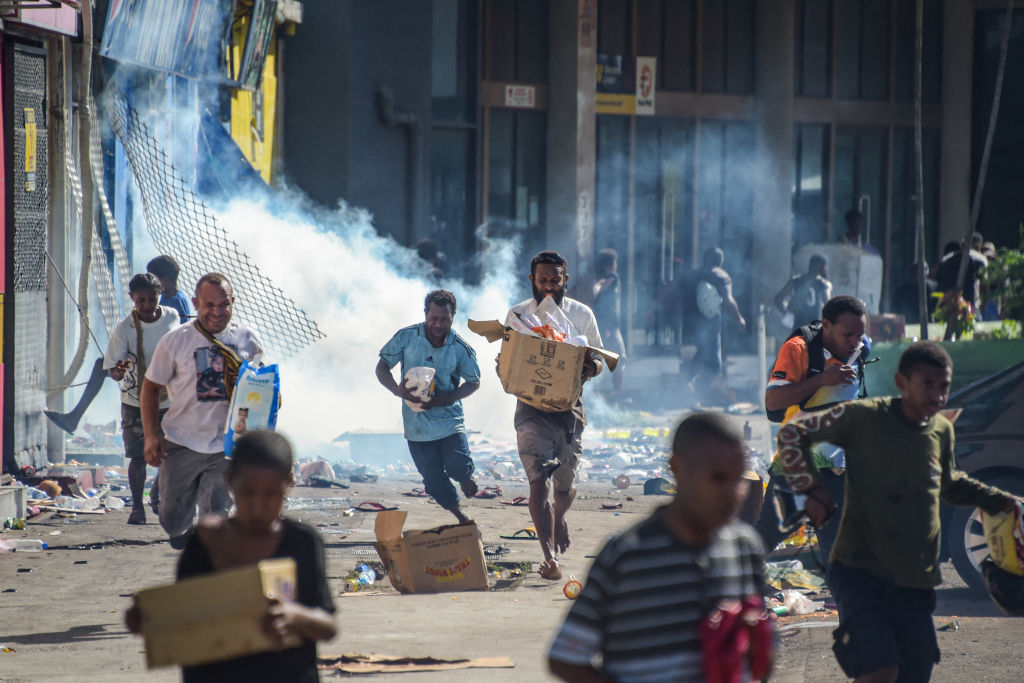[ad_1]
In his first international engagement for the year, James Marape has made history as the first prime minister from Papua New Guinea (or any Pacific Island State) to address the Australian parliament. Marape’s speech concentrated on the shared history between the two countries, recognising Australia’s support from its colonial administration to the present day. Marape also spoke of PNG’s economic development, highlighting the growth of the economy from K80 billion to K111 billion, which has occurred under his watch since 2019.
By addressing the Australian parliament, Marape joins an elite and short list of other world leaders that have been accorded the same privilege. He delivered the address, he said, not as an individual, but as the “chief servant” of the nation. Marape spoke of elevating the relationship between Australia and PNG, as sovereigns, to the highest level, and of the deep cultural ties that exist between Torres Strait Islanders and Papua New Guineans in the nation’s Western Province.
By all measures, Marape’s address was a deeply personal one. It received significant global attention.
Marape’s speech also emphasised the geological connectedness of the two nations by way of the Australasian continental plate that holds PNG and Australia together, or in Marape’s own words, joins the two “at the hip”. And he spoke of the interdependency that the prosperity of one country has on the other.
By all measures, Marape’s address was a deeply personal one. It received significant global attention. It affirmed the strength of the PNG–Australia relationship. Looking to the future, there may be value in considering whether such events should take place every ten years as a way of reinforcing the strength and longevity of the relationship that exists between the two nations.
Despite its significance, the domestic state of play in PNG and recent news of bilateral wheeling and dealing has the potential to overshadow much of the momentum that may have been created by the prime minister’s address.
Port Moresby’s Black Wednesday
Just last month, PNG’s capital Port Moresby was shocked by unprecedented rioting and destruction. The civil unrest occurred through a series of events that started with members of the nation’s police force protesting and standing down from duty in response to a pay cut in the salaries of all public servants. Opportunists took advantage of the absence of law enforcement by looting and torching businesses, resulting in K358 million (A$144.5 million) in damage and at least 16 recorded deaths.
The civil unrest has sparked numerous theories as to its underlying reasons – whether it was merely opportunistic, orchestrated for political influence, or due to the much larger social issue of rapid and uncontrolled growth in Port Moresby.

The latter seems to paint an accurate picture of the situation on the ground in the capital city. While Marape declares the figures indicate economic growth expanding by K31 billion, there seems to be a gap in how this increased investment and macroeconomic growth has trickled down to the ordinary person. The actions of the looters are indicative of a deep frustration over the increased cost of living, with inflation in PNG reaching 6.3 per cent in the third quarter of last year.
Government interventions
The Marape government has faced continued scrutiny over its response, including: a declaration of a 14-day state of emergency in the nation’s capital; suspension of senior government officials (including the Commissioner of Police); the setting up of a special task force to investigate the underlying causes of the civil unrest and the actions of police; a threat to ban social media; and a reshuffle of ministerial portfolios that did little to hold accountable the relevant political heads.
The Cabinet reshuffle has had the most effect. While it did little to address the civil unrest, the reshuffle did make way for the defection of members from the government, starting with the Minister for Energy. A further seven members of parliament walked away, withdrawing their support for the government just days after the unrest. Over the past weeks, additional members have joined this new Opposition, including PNG’s former prime minister Peter O’Neill, who resigned in 2019.
The government has come under question for a proposed security deal with China that looks to assist police with training, equipment and surveillance technology.
Reports from PNG indicate that this growing opposition has now satisfied the minimum requirement under PNG’s constitution to move a motion for a vote of no confidence.
Bilateral cooperation
The government has also come under question for a proposed security deal with China that looks to assist police with training, equipment and surveillance technology. Ironically, this is similar in scope to that envisaged under the recently signed Bilateral Security Agreement between PNG and Australia. Foreign Affairs Minister Justin Tkatchenko was quick to walk back his earlier comments that China’s proposal was on the table, dismissing any talks of a possible security relationship with China, saying PNG’s relationship with Beijing was focused mainly on trade.
What could happen next?
PNG’s parliament has its first sitting of the year this week, with the potential for a change in government. If that change occurs, it is unlikely to alter the short-term trajectory of PNG’s management in terms of the much-anticipated projects scheduled for this year, nor will there be a radical change in preferences of bilateral cooperation.
For now, the government still holds a majority with 56 members of parliament declaring their support. And with the Opposition only just nominating Allan Bird as the alternative prime minister, a motion would appear unlikely in the immediate term. But a day in PNG politics can feel like a lifetime in the “land of the unexpected”, where anything can happen.
[ad_2]




